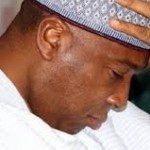IMF Team Canvasses Removal of Restrictions on Access to Foreign Exchange in Nigeria
Business News, Latest Headlines Saturday, February 27th, 2016
By Eric Ojo, Abuja
BALTIMORE, MD (AFRICAN EXAMINER) – Worried by the disturbing trends in foreign exchange market in Nigeria, a team of experts from the International Monetary Fund (IMF) has called for the removal of restrictions on foreign exchange recently introduced by the Central Bank of Nigeria (CBN) to protect country’s reserves.
The IMF team said the restrictions have impacted significantly segments of the private sector that depend on an adequate supply of foreign currencies, adding the CBN should come up with a credible package of policies that will sanitize the system.
The team which was led by Gene Leon to Nigeria recently to assess the economic impact of the sharp decline in oil prices and policies for addressing near-term vulnerabilities, as well as structural reforms to promote sustained inclusive growth and reduce poverty, also noted that the exchange rate should be allowed to reflect market forces more.
The team further harped on the need for the CBN to work assiduously towards improving the functioning of the interbank foreign exchange market (IFEM) as part of its measures to redress the situation.
The issue of improving the competiveness of the Nigerian economy was equally raised by the team. Eliminating existing macroeconomic imbalances and achieving sustained private sector-led growth, according to them, requires a renewed focus on ensuring the competitiveness of the economy.
“In light of the significant macroeconomic adjustment that is needed to address the permanent terms-of-trade shock, it will be important to put in place an integrated package of policies centered around, fiscal discipline; reducing external imbalances; further improving efficiency of the banking sector as well as fostering strong implementation of structural reforms that will enhance competitiveness and foster inclusive growth”, the team said in statement made available to African Examiner.
They also suggested that establishing medium-term fiscal policy goals that support fiscal sustainability should be made a top priority by the apex bank, adding that measures should be specifically implemented by the Nigerian government to boost the ratio of non-oil revenue to Gross Domestic Product (GDP), including from improvements in revenue administration and broadening of the tax base.
The team said the Nigerian authorities should also rationalize spending, adopt safety nets for the most vulnerable and foster enhanced accountability and ensure an orderly adjustment of sub-national budgets.
“It will be important for the regulatory and supervisory frameworks to ensure a strong and resilient financial sector that can support private sector investment across production segments (including SMEs) at reasonable financing costs.
The IMF team is supportive of the authorities’ ongoing efforts to promote targeted and core infrastructure (in power, integrated transport network, housing); reduce business environment costs through greater transparency and accountability, promote employment of youth and female populations”, they further recommended.
The team also stressed the need to prioritize steadfast implementation of structural reforms, adopting a sound Petroleum Industry Bill to will help strengthen the regulatory framework for the oil sector.
They equally called for the application of the Anti-Money Laundering/Combating the Financing of Terrorism framework, adding that emphasis should be sustained on doing “more with less” to improve the efficiency of public sector service delivery and create an enabling environment to attract investment.
The team noted that the draft 2016 budget envisaged appropriately, a significant shift in the composition of fiscal spending toward capital investment while increasing the allocation for a social safety net and the CBN at the same time has eased monetary conditions.
“With oil prices expected to remain low for a long time, continuing risk aversion by international investors, and downside risks in the global economy, the outlook remains challenging. The authorities’ policy response has focused on seeking to support growth, while preserving international reserves”, the team stressed.
In a related development, Nigeria is set to implement IMF’s Enhanced General Data Dissemination System (e-GDDS).
The e-GDDS was established in May 2015 to support improved data transparency, encourage statistical development, and help create synergies between data dissemination and surveillance.
Making such information easily accessible in both human and machine-readable formats, and based on an Advance Release Calendar, according to the IMF, will allow all users to have simultaneous access to timely data and will bring greater data transparency.
The development makes Nigeria the largest economy in the first wave of countries in Sub-Saharan Africa to implement the recommendations of the e-GDDS.
Related Posts
Short URL: https://www.africanexaminer.com/?p=30540






















